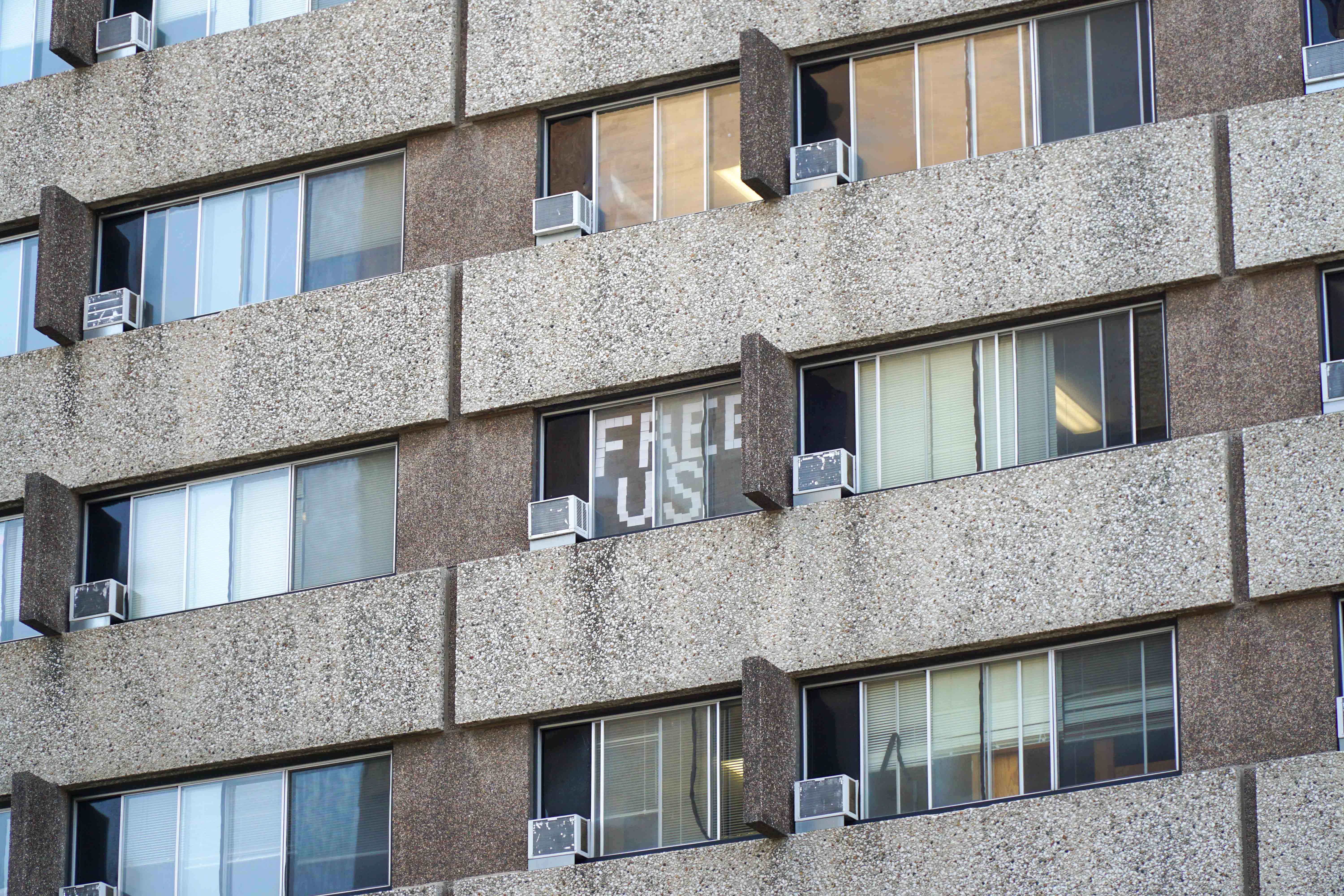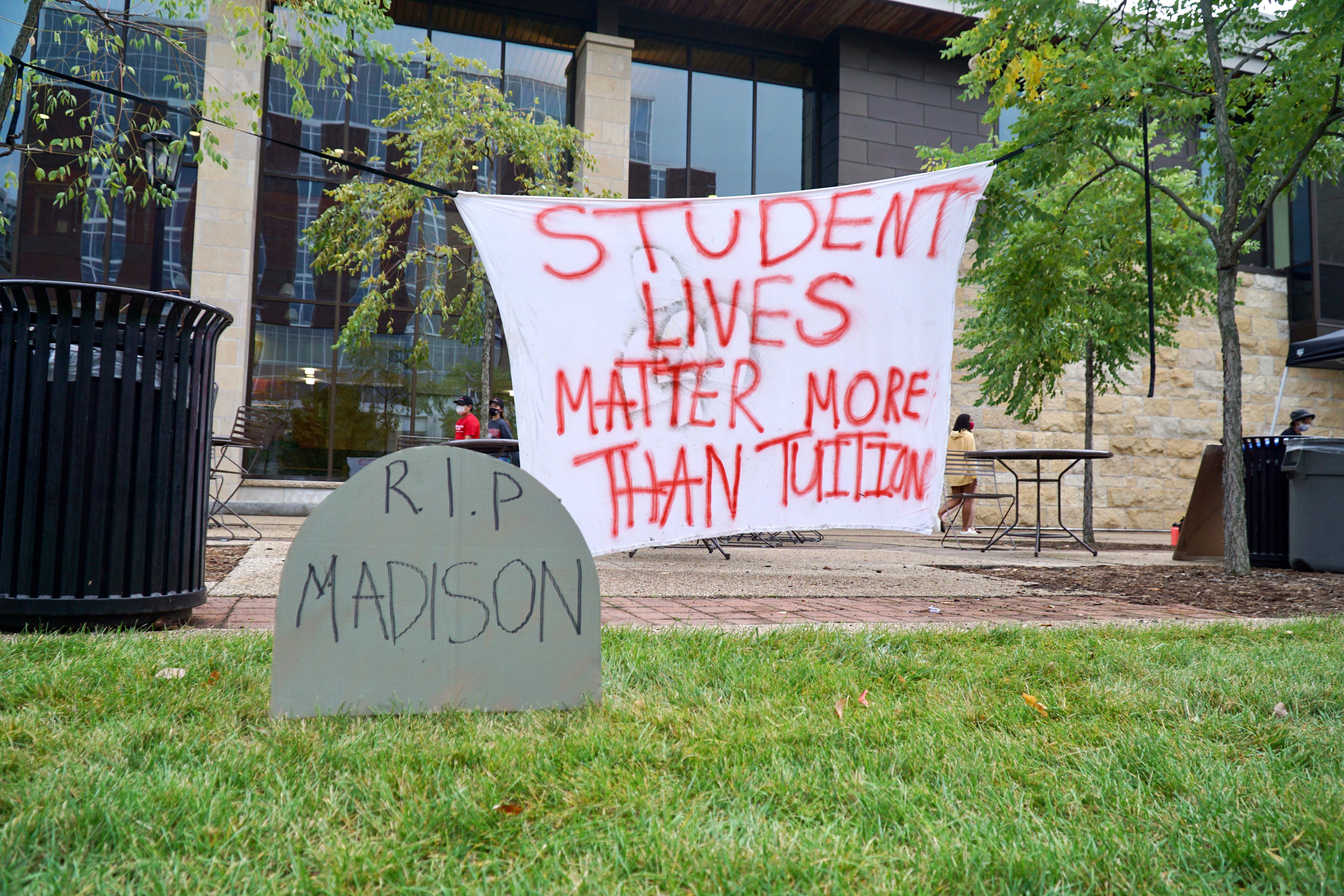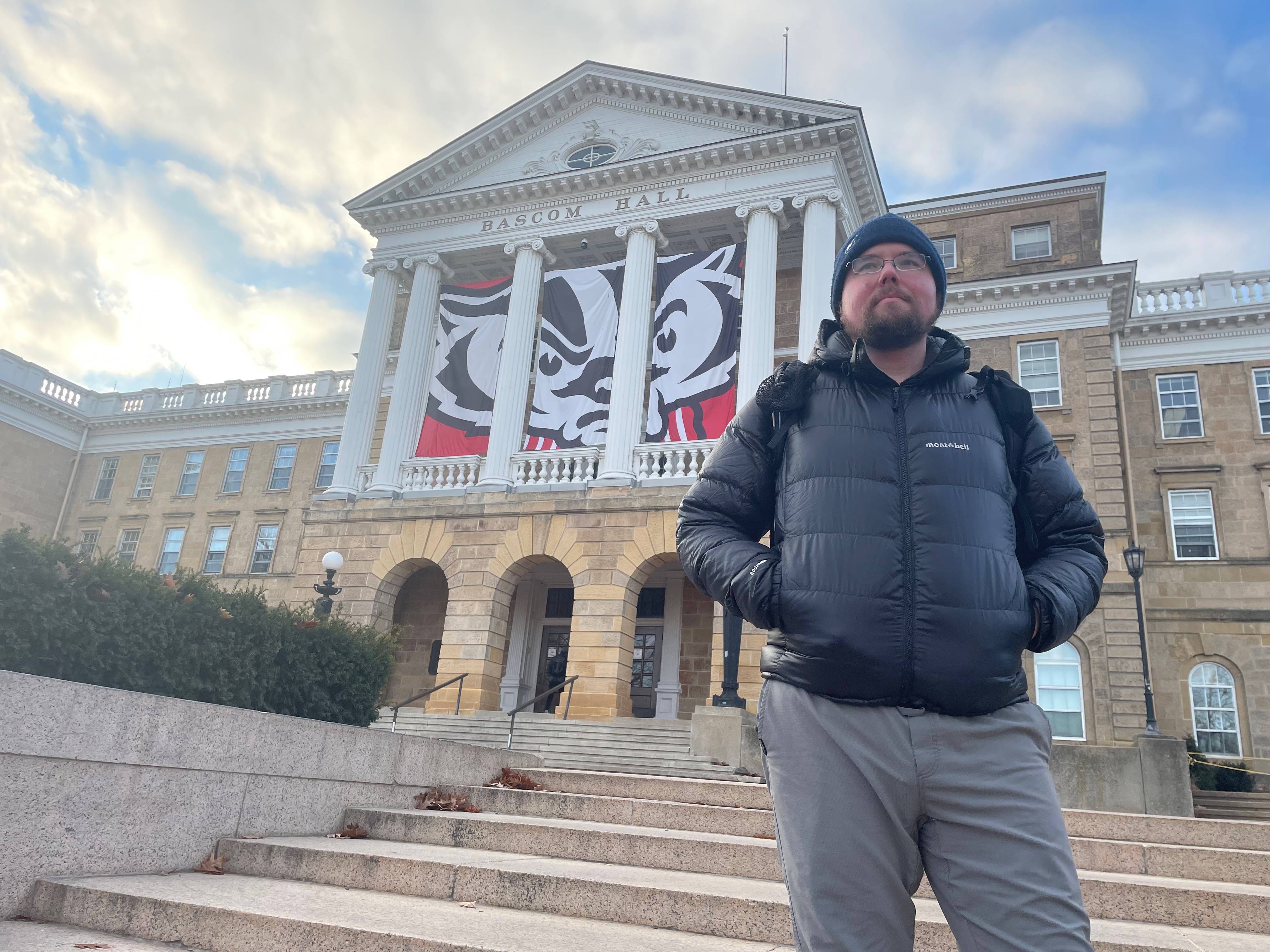Content warning: This story contains descriptions of targeted violence against Asian and Asian American people.
“SEND HELP,” said one sticky-note sign on the windows of a UW-Madison dorm in mid-September 2020.
“FREE US,” said another.
“WE ARE PISSED,” one read.
After UW-Madison reported back-to-back days with COVID-19 positivity rates of nearly 20%, Chancellor Rebecca Blank directed students in Witte and Sellery Residence Halls, two of the largest dorms on campus, to quarantine for two weeks.
Students said they were given a 90-minute notice of the lockdown, the Badger Herald reported.

“Students were given the option to return home during that time, which many did,” wrote Vice Chancellor of Student Affairs Lori Reesor in an email to NBN, adding that many universities experienced rising COVID numbers when students returned to campus in Fall 2020.
“How do you tell a 19-year-old at a Big Ten party school not to go to [the fraternity row]?”
– Co-president of UW-Madison’s Teaching Assistants Association John Walker
While some students said quarantining was the right choice, the Badger Herald reported those who stayed in the dorms complained about low-quality meals and “widespread stress” due to the last-minute lockdown announcement.
Some student leaders and activists said students shouldn’t have been brought back in the first place.
“There was no vaccination yet, and so they were just telling people, ‘Be careful, don’t party,’” said John Walker, co-president of UW-Madison’s Teaching Assistants Association (TAA), the graduate student union. “How do you tell a 19-year-old at a Big Ten party school not to go to [the fraternity row]?”
COVID on campus
When Chancellor Blank announced she was leaving for Northwestern, UW-Madison student Ella Deitz said her first feeling was relief.
“A lot of her decisions, especially in this pandemic, have been really exhausting,” said Deitz, who added she thinks many students on campus felt the same. “Time and time again, it felt like she was prioritizing profit.”
ASM graduate student representative Jack Phillips called the university’s decision to bring students back to campus despite continuing virtual classes a “bald money grab for dorm fees.”

About a hundred students protested the decision to re-open the university at full capacity through the administration’s COVID-19 Smart Restart plan in Fall 2020. While large classes remained virtual, many smaller classes had in-person components. The protest, led by UW-Madison’s BIPOC Coalition, was called “Gordon’s Graveyard,” named after the dining hall and marketplace where quarantined students ate.
Executives in Dane County, Wisconsin, where UW-Madison is located, said a then-record-breaking number of cases in Fall 2020 could be attributed to the university’s re-opening.
“The only thing they relied on was PR and optics. If you just paint a picture and pretend it’s okay, then nothing wrong is really happening,” Walker said. “Meanwhile, undergrads are getting sick left and right … It was gaslighting supreme.”

In summer 2021, students in one of the largest graduate apartment complexes on campus, Eagle Heights, were told COVID-positive undergraduate students would be quarantined in the complex. Walker said Eagle Heights houses many international students and students with children.
“[These are people] who are bringing their families over to change their lives and are giving their all to the research and to the advancement of this university, and this university’s like ‘OK, we’re going to put a 19-year-old who couldn’t keep themselves from going out and partying right next to you,’” Walker said. “It’s fucked up.”
As far as the university knew, Lucas said, “no one was put at risk or infected with COVID-19” due to the use of Eagle Heights as a quarantine facility.
“Meanwhile, undergrads are getting sick left and right … It was gaslighting supreme.”
– Co-president of UW-Madison’s Teaching Assistants Association John Walker
When COVID-19 vaccines became widely available, UW-Madison chose not to mandate them. The university is funded through Wisconsin’s Republican-led legislature. UW-Madison economics professor Jeffrey Smith said the university likely chose not to mandate vaccines because it did not want to “antagonize the legislature.”
“Becky did a pretty good job with a tough hand of cards,” said Smith on Blank’s COVID response.
However, some students thought the university should have stood up to politicians. Walker pointed to vaccine mandates implemented at Michigan universities that have been challenged by Republicans.
“They stood up against crazy Republican legislatures, right?” Walker said. “Why can’t they do that here? Where’s the leadership?”
The administration said that mandates are made on the University of Wisconsin system level, which comprises 13 universities, rather than at the level of individual universities. It added that UW-Madison has one of the highest vaccination rates for universities without mandates. As of September 2021, 88% of UW-Madison undergraduate students were fully vaccinated.
“At the time I was frustrated and wanted a vaccine mandate, but we didn’t need one,” said Aerin Leigh Lammers, an ASM representative who chairs the COVID Student Advisory Board. “Our students did it all on their own.”
Denying accommodations
When English professor Elizabeth Bearden asked to teach remotely in the Fall of 2021, her request was denied. The university said it would cause “undue hardship” on its operations.
Bearden is blind. Losing her sense of taste or smell would be devastating to her. Despite being vaccinated, Bearden said her doctor warned she would still face many risks if she returned to in-person teaching, the Milwaukee Journal Sentinel reported. Bearden filed a disability discrimination lawsuit.
“I am normally a pretty even-keel person, and this has just wrecked me,” Bearden told the Milwaukee Journal Sentinel. “I have had so much anxiety and [I’m] just dealing with this sense of betrayal.”
The university told the Milwaukee Journal Sentinel they value employees with disabilities and commit to a careful review of each accommodation request. Bearden did not respond to a request for comment from NBN.
“That’s very much Becky Blank’s M.O. She does not even come to the table. It’s not even acting in bad faith; there’s no faith at all.”
– Co-president of UW-Madison’s Teaching Assistants Association John Walker
Phillips said Bearden isn’t the only professor who has been denied accommodations.
“No professors get remote,” Phillips said. “Not even, in this case, someone who is blind and cannot see if people are wearing masks.”
Walker said teaching assistants (TAs) leading in-person classes were not allowed to move classes online, even if they tested positive for COVID. Instead, TAs were required to find a replacement instructor.
“I know TAs that have gotten reprimanded and threatened with losing their jobs because they [moved classes online],” Walker said. “If a student gets sick in a section or in a class, instructors and TAs are not allowed to tell people. Supposedly they will be informed by the university, although I know for a fact that hasn’t happened.”
University spokesman John Lucas said TAs are expected to teach classes “in the modality indicated in the schedule of the classes.” The university’s COVID-19 policy says testing information will not be shared with instructors, and instructors are not allowed to tell anyone if a student becomes sick due to medical privacy concerns.
Walker said the university would not sit down with the TAA to discuss the group’s concerns.
“That’s very much Becky Blank’s M.O.,” Walker said. “She does not even come to the table. It’s not even acting in bad faith; there’s no faith at all.”
Phillips, a biomedical engineering PhD student, said the administration dismissed university scientists’ concerns regarding COVID-19 safety policies.
“[They treated us] like we’re children who don’t know what they’re talking about,” Phillips said. “Which is weird, because this is our job.”
In January 2022, the TAA wrote an open letter asking for stronger COVID safety policies, including remote learning for the first two weeks of Spring Semester. More than 400 members of the UW-Madison community signed the letter. The university did not respond.
Violence against Asians at UW-Madison
When COVID-19 arrived in the United States, UW-Madison student Brian Li felt people treated him differently at UW-Madison.
“I felt sort of different,” said Li, an international student from China. “There’s a barrier between me and other students. I don’t get a pass. It’s like, it’s a basic assumption that people who look Asian, they are infected.”
While Li was glad to see the university send out emails in support of the Asian community, specifically after racist chalk messages were written on a campus sidewalk, BIPOC Coalition co-founder Tarah Stangler, who is half Korean, said all the university did amid the rise in anti-Asian hate crimes was send emails. As NBN previously reported, Blank said she was unaware anti-Asian hate incidents rose on campus during the pandemic.
“The emails that got sent out [were] like, ‘There are group therapy sessions we’re putting on.’ OK, great, but what are you doing to tackle racism on campus?”
– BIPOC Coalition co-founder Tarah Stangler
The email that frustrated Stangler the most was sent out when eight people, including six Asian women, were shot and killed in Atlanta. She felt UW-Madison made no attempts to educate white students on the history of anti-Asian violence.
“For the university to do so fucking little and to expect the Asian American population to do all of the educating, was one of the most disgusting displays of performative activism that they do, and the same thing happened when George Floyd was killed,” said Stangler. “The emails that got sent out [were] like, ‘There are group therapy sessions we’re putting on.’ OK, great, but what are you doing to tackle racism on campus?”
Stangler said she’s been harassed for being an Asian woman while walking past the fraternity row on campus. Once on campus, an elderly white woman spit on her and told her the pandemic was her fault. A Madison man was charged with a hate crime against an Asian UW-Madison student last November for a similar spitting incident to Stangler’s – one of several anti-Asian hate incidents recorded at UW-Madison amid the pandemic.
“For somebody to spit on me, literally in that divide between campus and city, just proved to me that people feel emboldened to act this out of pocket toward people of color,” Stangler said. “They know nothing’s going to be done.”
“A completely different world”: UW-Madison’s students of color
According to a March 2021 report by UW-Madison, 68% of the university’s undergraduates were white in the Fall 2020 Semester. For reference, Northwestern’s Class of 2025 is 52% white.
The university has introduced several initiatives to increase diversity on campus and create an inclusive environment, such as adding name pronunciations to Canvas profiles, funding several scholarships for students of color and creating a Diversity and Inclusion Student Advisory Board.
“It sucks balls, just being a Black person at UW.”
– BIPOC Coalition co-founder and District 8 Alder Juliana Bennett
Lammers said Blank has focused on diversity during her tenure, and does “some of her best work fundraising” for students of color. She pointed to the Raimey-Noland Campaign, which has raised $40 million to support diversity and inclusion on campus, half of which went directly to student aid.
“If you were to talk to the chancellor or anyone in administration about this, they would likely refer to the scholarships they’ve created or increasing students of color on this campus,” said Juliana Bennett, BIPOC Coalition co-founder and Alder of District 8 in Madison. “As a response to that, I would say we should not only focus on increasing diversity on campus, but when these students come here, we need to make this campus a safe space for them here.”
Nile Lasana, former co-editor in chief at The Black Voice, UW-Madison’s Black student paper, said administrators never had any sense of urgency when it came to dealing with issues pertaining to marginalized students on campus.
“If you’re white and you go to UW-Madison, you genuinely live in a completely different world than a queer student, or a Black student, or a Latinx student, or a Native student,” Lansana said. “You just live in a completely different world.”
Bennett said she’s experienced everything from daily microaggressions to hearing the N-word with a hard “R” on campus. The university, Bennett said, does not do enough to educate white students or to provide spaces for students of color.
“It sucks balls, just being a Black person at UW,” Bennett said. “Knowing how this university treats people of color, and how our voices are silenced, just honestly, it takes away a lot of the pride I can have in the university. I can love it, but I wouldn’t recommend a person of color to come to UW.”
Bennett said it makes sense Blank will be going from one predominantly white university to another.
“I don’t think Chancellor Blank would have – and this isn’t necessarily a slight on her – but I don’t think she would have the experience or wherewithal to be able to handle a university that is more diverse,” Bennett said.
Blank’s tenure as Northwestern’s 17th president begins in June.
"blank" - Google News
March 02, 2022 at 11:48AM
https://ift.tt/2QsWKv1
Living on Blank's campus - North by Northwestern
"blank" - Google News
https://ift.tt/W1lih6g
https://ift.tt/X7E0OTx
Bagikan Berita Ini














0 Response to "Living on Blank's campus - North by Northwestern"
Post a Comment